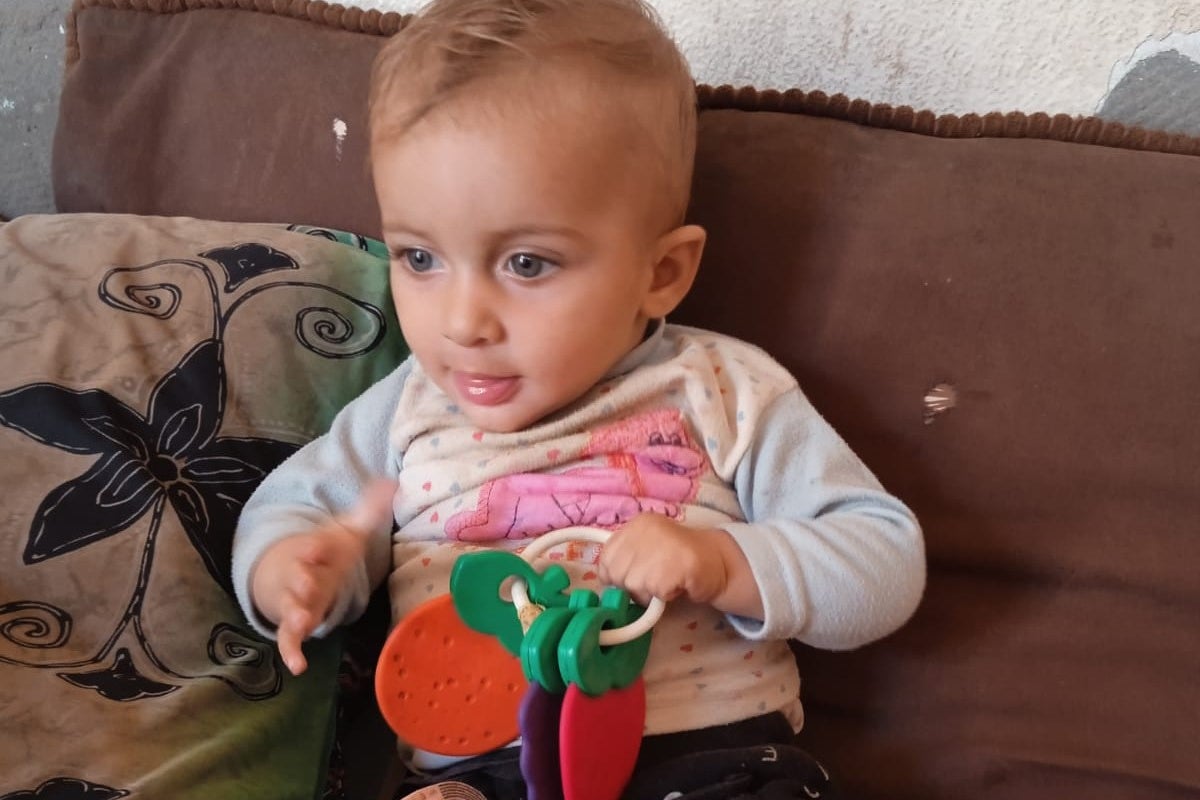A one-year-old baby girl has died from malnutrition amid the escalating starvation crisis in Gaza, aid workers who tried to save her have said.
Sanaa Mansour al-Lahham never got to know a life without war before she died in a hospital in the territory in July as a result of prolonged nutritional deficiency and a lack of baby formula, according to the charity Humanity & Inclusion.
Earlier this month, UN spokesperson Stephane Dujarric warned that starvation and malnutrition in Gaza were at their highest levels since the war began.
Nearly 12,000 children under the age of five were found to have acute malnutrition in July, according to the UN – including more than 2,500 with severe malnutrition, the most dangerous level. The World Health Organisation said that the numbers are likely an undercount.
On Friday, global hunger monitor the Integrated Food Security Phase Classification (IPC) declared that 514,000 people – nearly a quarter of Palestinians in Gaza – are now experiencing famine.
Despite widespread international condemnation, the Israeli military looks set to push ahead with the next stage of its ground offensive on the territory’s largest city, Gaza City, sparking fears that the health crisis will only get worse. Baby Sanaa’s death is just one example of the suffering taking place.
“Sanaa was born during the war,” says one of Humanity & Inclusion’s rehabilitation specialists, Haytham Abu Hadroos, who was part of the team that took care of the infant. “She was a little girl who knew nothing about the cruelty of the world she entered. From her very first breath, the humanitarian situation in Gaza was collapsing day by day. Access to food, milk, or medicine became nearly impossible. From her first day, she faced conditions that no child should ever know.”
The international aid charity said it first became aware of Sanaa’s plight when an exhausted and desperate young mother walked into a UN shelter at al-Haker School in Deir al-Balah, with one arm broken and her daughter held in the other.
“She looked exhausted – physically and emotionally – after running from one hospital to another across the Gaza Strip, searching for answers, hope, and someone to tell her what was wrong with her daughter,” Hadroos says. “Her child, once joyful and playful, had suddenly changed after a high fever. She stopped crying, no longer moved like before, didn’t roll or interact. She simply stayed still, moving her head and limbs slightly, as if sinking into silence.
It turned out Sanaa had developmental delays, the charity explains. Medical experts say high fevers in infants can be a sign of serious infection, which can cause lasting neurological injury if not treated immediately – a common occurrence given the scarcity of medical facilities in Gaza.
Malnutrition weakens the developing brain and immune system, increasing the risk of neurodevelopmental issues. Sanaa’s body likely had no reserves to fight back when her fever struck, and her condition would have deteriorated without proper nutrition or medical intervention.
Humanity & Inclusion says that hope was briefly reignited in March when its team began physiotherapy sessions with Sanaa to help her recover movement, together with occupational therapy and psychosocial support.
After three sessions, they reported that Sanaa could roll over and sit with minimal support. “Her mother cried tears of joy,” says Hadroos. “It was the first time she saw real hope in months.”
But that hope did not last long. Despite the medical care Sanaa received, and her transfer to Shuhada al-Aqsa Hospital in Deir al-Balah, the infant’s condition deteriorated. On 17 July, Sanaa died from starvation, the charity says.
“Sanaa is more than just a case – she wasn’t a statistic,” says Hadroos. “She was a child – a life born into war, who faced the world with silent eyes and left too soon. In her story, there is not only grief but also a question to the world: how many more children will we allow to disappear before starvation in Gaza is recognised as the emergency it truly is?
“This tragic loss highlights the urgent need for an immediate and permanent ceasefire and the unimpeded access of humanitarian aid, as well as continued support and interventions for vulnerable groups, such as persons with disabilities and children.”
According to the Gaza health ministry on Thursday, 271 Palestinians, including 112 children, have died of malnutrition-related causes since the war began. Israel disputes the figures, while Israeli prime minister Benjamin Netanyahu has claimed that reports of starvation are “lies” promoted by Hamas and that any suffering in the territory is down to the terror group.
“Over 100,000 trucks of aid have entered Gaza since the start of the war, and in recent weeks a massive influx of aid has flooded the Strip with staple foods and caused a sharp decline in food prices, which have plummeted in the markets,” the Israeli ministry said in a statement denying reports of famine.
More than 62,000 Palestinians have been killed since 7 October 2023, according to Gaza health officials. The Hamas attacks on 7 October killed around 1,200 people with around 250 taken captive.
As the humanitarian situation reaches “catastrophic” levels, Humanity & Inclusion says it is sounding the alarm on the “devastating and irreversible” impact of starvation in Gaza, particularly on disabled people and children. “What we are witnessing is not only a manmade crisis, but one that is rapidly creating a generation of people with lifelong disabilities, caused directly by prolonged malnutrition and lack of access to essential aid.”
George Graham, the charity’s executive director, explains: “As starvation hits everyone in the Gaza Strip, it leaves a disproportionate impact on children and people with disabilities. Malnutrition is a leading cause of disability – we risk an entire generation being born with disabilities due to famished and malnourished mothers.”

